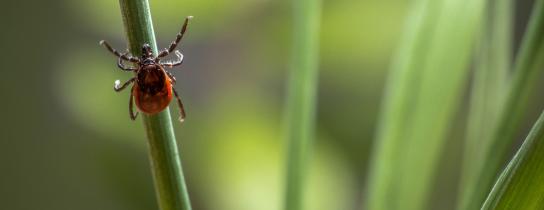
What You Need to Know About Lyme Disease
A Message from Our Infectious Disease Doctors
Lyme disease is a bacterial disease transmitted to humans after they’re bitten by an infected tick. We sat down with Crystal Run Healthcare’s Infectious Disease doctors Anousheh Ghezel-Ayagh, MD, Malloy Nair, MD, and Aria Williams, DO, FACOI to find out answers to the most important questions dealing with tick bites. We are excited to announce that West Nyack will be welcoming its own infectious disease specialist in July, 2018 – Arturo G. Pascual, Jr., MD.
How should I remove the tick?
The best way to remove a tick is with tweezers. First, grasp the tick near its mouth and pull in an upward, steady motion away from your skin. Then, disinfect the area with soap and water, rubbing alcohol, or hydrogen peroxide. The last step of the tick removal process is to record the date and location of the tick bite to monitor the area for changes. Disease risk is reduced if the tick is removed within 36 hours of first being bitten. For more information on tick removal, check out New York State Department of Health’s (NYSDOH) video guide to tick removal: https://www.youtube.com/watch?v=oGrK4ZKUfhQ
When should I see a healthcare provider for a tick bite?
The person who was bitten (or the parents, if a child was bitten) should observe the area of the bite and look for expanding redness. The redness suggests Erythema Migrans or EM, also known as a “bull’s eye” rash, the characteristic rash of Lyme disease. Approximately 80 percent of people with Lyme disease develop EM and 10 to 20 percent of people have multiple lesions. If you develop a rash or flu-like symptoms such as fever, fatigue, joint pain and body aches, contact your health care provider immediately for proper diagnosis and treatment.

Erythema Migrans, the bull’s eye rash, appears on the skin after being bitten by a tick.
Do I need antibiotics after a tick bite?
Although not routinely recommended, taking antibiotics within three days of a tick bite may be beneficial for some people. This applies to deer tick bites that occur in areas where Lyme disease is common and there is evidence that the tick fed for more than one day. If you experience a case like this, discuss the possibilities of antibiotics with your doctor.
What are concerning symptoms that I should look for after a tick bite and let my doctor know about?
Symptoms, such as rash, fever, chills, fatigue, body aches, and joint pain can occur, but they may seem too mild to require medical attention. As Lyme disease progresses, severe fatigue, a stiff neck, tingling or numbness in the arms and legs, or facial paralysis can occur.
The most severe symptoms of Lyme disease may not appear until weeks, months or years after the tick bite. These can include severe headaches, painful arthritis, swelling of the joints, and heart and central nervous system problems.
The best defense is to make tick checks a part of your daily routine. If you go outside or you own pets, you run the risk of being bitten by a tick, so make sure to check yourself and your family members’ bodies after being outdoors. Contact your healthcare provider immediately if a rash develops or you experience flu-like symptoms.
Bitten by a tick? Call Crystal Run Healthcare’s tick hotline 845-703-6448 to ask questions, discuss concerns, and schedule a doctor’s appointment if needed. At Crystal Run, we want you healthy.
Anousheh Ghezel-Ayagh, MD earned his Medical Degree from Tehran University of Medical Sciences and completed his Residency in Internal Medicine at St. Vincent’s Hospital and Medical Center in Worcester, MA. He is Board Certified in Infectious Disease and completed his Infectious Disease Fellowship at University of Connecticut in Farmington, CT. He specializes in all aspects of Infectious Disease and is seeing patients at Middletown, Monroe, Newburgh, Rock Hill, and Warwick locations.
Arturo G. Pascual, Jr., MD earned his Medical Degree at Cebu Doctors University in Mandaue City, Cebu, Philippines and completed his Residency in Internal Medicine at New York Medical Center, Westchester Medical Center in Valhalla, NY. He is Board Certified in Internal Medicine and completed his Fellowship in Infectious Disease also at New York Medical Center, Westchester Medical Center. He specializes in Internal Medicine and Infectious Disease and is seeing patients in Crystal Run’s West Nyack location.
Malloy Nair, MD earned her Medical Degree from SUNY Health Science Center at Brooklyn, NY and completed her Residency in Internal Medicine at Robert Wood Johnson Medical Center in New Brunswick, NJ. She is Board Certified in Internal Medicine and Infectious Disease and completed her Infectious Disease Fellowship also at Robert Wood Johnson Medical Center. She specializes in general Infectious Disease and is seeing patients at Middletown, Monroe, Newburgh, Rock Hill, and Warwick locations.
Aria K. Williams, DO, FACOI earned her Medical Degree at the University of Medicine and Dentistry of New Jersey (UMDNJ), School of Osteopathic Medicine in Stratford, NJ and completed her Residency in Internal Medicine also at UMDNJ, School of Osteopathic Medicine. She is Board Certified in Internal Medicine and Infectious Disease and completed her Fellowship in Infectious Disease at UMDNJ, School of Osteopathic Medicine. She specializes in general Infectious Disease and is seeing patients at Middletown, Monroe, Newburgh, Rock Hill, and Warwick locations.

 Optum Radiology at Crystal Run Healthcare
Optum Radiology at Crystal Run Healthcare Request medical records online
Request medical records online